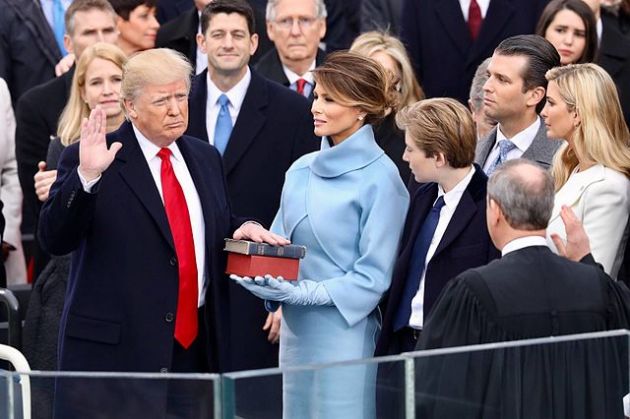Stormy issue of pornography, Trump and his firm evangelical support grips some of US media

Pornography, Donald Trump and evangelical Christians are being called an unholy alliance by parts of the U.S. media.
"Evangelical support of Trump has helped pornography enter the cultural mainstream," read a headline in the Chicago Tribune on March 27.
Julian Fea wrote in the newspaper, "This past Sunday we all gathered around our television sets to watch a porn star talk about an adulterous encounter she had with a man who would become the president of the United States. Times have changed.
"Not since the Bill Clinton-Monica Lewinsky scandal of 1998 has the sex life of a president been on display in such a public manner. On Sunday it was Stormy Daniels. The week before it was former Playboy Playmate Karen McDougal telling the nation, among other things, that she had unprotected sex with Donald Trump."
Through all this, U.S. polls, which Trump said during his pre-election campaigning could never be trusted, have shown evangelical support for the president generaly holding firm.
The New York Times carried a story March 11 showing some evangelicals may be wavering.
Carol Rains, a white evangelical Christian, said hse has no regrets voting for Trump.
She told The New York Times she likes most of his policies and would still support him over any Democrat. But she said she is open to another Republican.
White evangelical pride themselves on traditional values such as marital fidelity, but this aspect of purity seems to have scant relevance for many evangelicals.
Still, according to data from the Pew Research Center, quoted by The New York Times said support among white evangelical women in recent surveys has dropped about 13 percentage points, to 60 percent, compared with about a year ago.
That is even greater than the eight-point drop among all women.
Still on March 27, Elizabeth Bruenig wrote in a piece in The Washington Post headlined "Evangelicals' support for Trump will cost them – spiritually."
She said, "Stephanie Clifford, a.k.a. Stormy Daniels, the adult-film actress who allegedly had an affair with Donald Trump shortly after the birth of his son Barron, has now broken her contractually mandated silence on the tryst, somehow revealing more than anyone likely wanted to know and nothing we didn't already.
"I suspect that no one who cast their vote for Trump would have seriously doubted, if asked, that something like this was part of his past -- it isn't as though he ever paid anything more than the most perfunctory lip service to personal virtue."
Bruenig noted that clarity and detail add a dimension to the situation that assumption lacks, and that from Trump's base who consider themselves concerned with public morality are now faced with an uncomfortable reality.
She wrote, "One either takes the Christian notion of forgiveness seriously -- with all its accompanying expectations of repentance, contrition and accountability -- or one doesn't.
'HOLDING TRUMP ACCOUNTABLE'
"Evangelicals who aren't willing to hold Trump accountable for the way he has lived are themselves choosing a particular way of living, one which, with time, may dissolve whatever misgivings they may still maintain, somewhere deep inside."
Gary Abernathy, publisher and editor of the (Hillsboro, Ohio) Times-Gazette tried to explain some of that support.
He wrote in September in a piece carried by The Post that evangelical Christians voted for Donald Trump in overwhelming numbers.
He also said that support for the president remains relatively firm.
"Most evangelical believers don't condemn Trump for the litany of words or deeds that so disturb others, even when they disapprove," Abernathy wrote.
"Probably half the people in churches across the country defined as "evangelicals" were converted from lives that were even more unprincipled than the life Trump has led. Some experienced divorces, others used foul language, and many were addicted to drugs or alcohol."
Abernathy concluded, "They know Donald J. Trump is not worthy of the grace of God, because neither were they -- which, to them, is the mystery and beauty of this undeserved gift."
Katha Pollitt had a different take on it in an article titled "Why Evangelicals—Still!—Support Trump," in The Nation on March 22.
A sub-head in her piece said, "If you leave out the part about him being a corrupt, immoral con man and bully, there's lots for them to like."
"Say what you will about the terrible, terrifying Trump years, one good thing has already come out of them: the discrediting of evangelical Christianity.
"For decades, believers have boasted of their superior virtue, especially in matters of sex and marriage and parenting and social propriety.
"They've blasted premarital and extramarital sex, LGBTQ people, divorce, pornography, sex work, foul language, crude behavior, and not being a Christian—as they define 'Christian' -- blaming these things for everything from 9/11 to Hurricane Katrina."
She cites a piece in the latest edition The Atlantic, Michael Gerson, a former Bush speechwriter and current Washington Post columnist, mourns the loss of evangelical credibility in an angry, eloquent essay, "The Last Temptation."
"As Gerson writes: 'The moral convictions of many evangelical leaders have become a function of their partisan identification. This is not mere gullibility; it is utter corruption.'"
She reels off a litany of sin such as excusing racism from Trump, concluding, "Best of all, Trump is the one New Yorker who will never make them feel the least bit culturally inferior. After all, they are virtuous, and he is not."
